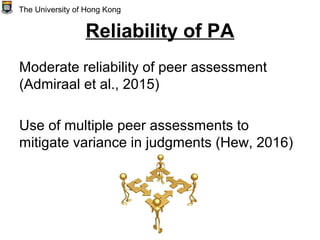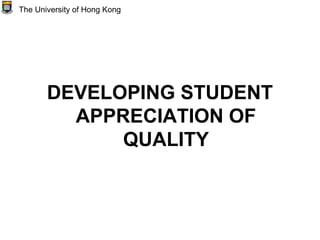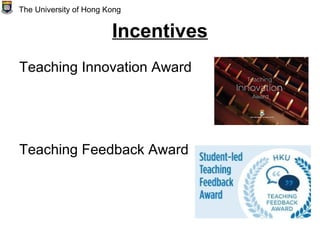Scaling up Assessment for Learning
- 1. Scaling up Assessment for Learning CITERS 2017, June 9 Professor David Carless University of Hong Kong The University of Hong Kong
- 2. Overview • Assessment for learning (AfL) • AfL & MOOCs • Peer feedback & technology • Leadership & communities of practice The University of Hong Kong
- 3. The University of Hong Kong
- 4. Chapter 1: Scaling up AfL: Progress & prospects (Carless) Chapter 14: How does Technology enable Scaling up AfL? (Dawson & Henderson) The University of Hong Kong
- 5. AfL definition Assessment for which the first priority is promoting students’ learning (Black et al., 2004) Cf. Formative assessment Learning-oriented assessment (Carless, 2007, 2015a) The University of Hong Kong
- 6. Interlinked AfL strategies 1. Productive assessment design 2. Students making judgments 3. Effective feedback processes 4. Developing student appreciation of quality (Carless, 2017) The University of Hong Kong
- 7. Scaling up (Coburn, 2003) Spread Depth Sustainability Shifts in ownership The University of Hong Kong
- 8. Why scale-up AfL? Research evidence (Black & Wiliam, Hattie) Dissatisfaction with current assessment & feedback practices The University of Hong Kong
- 9. Black & Wiliam (1998) Formative assessment & learning gains Effect sizes: 0.4 - 0.7 … But implementation is generally weak The University of Hong Kong
- 10. Hattie: Visible Learning The University of Hong Kong
- 11. MOOCs & AfL The University of Hong Kong
- 12. MOOC Assessment design Alignment of goals, activities & low-stakes assessment MC quizzes + automated feedback Higher order thinking? The University of Hong Kong
- 13. Peer assessment Peer reviewed assignments + detailed rubrics as key feature of MOOCs (Admiraal et al, 2015; Huisman et al., 2016) The University of Hong Kong
- 14. Reliability of PA Moderate reliability of peer assessment (Admiraal et al., 2015) Use of multiple peer assessments to mitigate variance in judgments (Hew, 2016) The University of Hong Kong
- 15. Peer feedback for learning Learners gain more from composing than receiving peer feedback (Nicol et al., 2014) The University of Hong Kong
- 16. Peer & Self-evaluation Students did 5 peer reviews then self- evaluated own work (Hew, 2016) The University of Hong Kong
- 17. FEEDBACK PROCESSES & TECHNOLOGY The University of Hong Kong
- 18. Audio & Video feedback Rapport Nuance Personalisation Monologue or Dialogue? Time saver? The University of Hong Kong
- 19. Peer video feedback Peer-to-peer video feedback delivered via Facebook Hung (2016) The University of Hong Kong
- 20. Personalised feedback at scale Using learning analytics to scale the provision of personalised feedback https://www.ontasklearning.org/ The University of Hong Kong
- 21. Sustainable feedback Students generating & using feedback from peers or self as part of self-regulated learning (Carless et al., 2011) The University of Hong Kong
- 22. DEVELOPING STUDENT APPRECIATION OF QUALITY The University of Hong Kong
- 23. MOOC limitation? MOOCs do not systematically develop student understanding of quality (Dawson & Henderson, 2017) The University of Hong Kong
- 24. Using exemplars The University of Hong Kong Exemplars convey messages that nothing else can (Sadler, 2002)
- 25. The University of Hong Kong
- 26. Appreciating quality Students need to debate nature of quality & develop capacities in making judgments The University of Hong Kong
- 27. SCALING UP POSSIBILITIES The University of Hong Kong
- 28. Enhancing design Adding technology to existing design & expecting improvements is flawed Invest in improved assessment & feedback designs to leverage gains from technology (Dawson & Henderson, 2017) The University of Hong Kong
- 29. Leadership Resourcing & support Incentives & rewards The University of Hong Kong
- 30. TELI Technology-Enhanced Learning Initiative The University of Hong Kong Associate Vice-President (Teaching and Learning) Ricky Kwok
- 31. Incentives Teaching Innovation Award Teaching Feedback Award The University of Hong Kong
- 32. Communities of practice (CoPs) Surfacing and sharing AfL practices (Hounsell & Zou, 2017) The University of Hong Kong
- 33. Staff development Good CoPs Dialogue & communication The University of Hong Kong
- 35. References Admiraal, W., Huisman, B., & Pilli, O. (2015). Assessment in massive open online courses. The Electronic Journal of e-Learning, 13(4), 207-216. Black, P., Harrison, C., Lee, C., Marshall, B., & Wiliam, D. (2004). Working inside the black box: Assessment for learning in the classroom. Phi Delta Kappan, 86(1), 8-21. Black, P., & Wiliam, D. (1998). Assessment and classroom learning. Assessment in Education, 5(1), 7-74. Carless, D. (2007). Learning-oriented assessment: Conceptual basis and practical implications. Innovations in Education and Teaching International, 44(1), 57-66. Carless, D. (2015a). Exploring learning-oriented assessment processes. Higher Education, 69(6), 963-976. Carless, D. (2015b). Excellence in University Assessment: learning from award-winning teachers. London: Routledge. Carless, D. & K.K.H. Chan (2016). Managing dialogic use of exemplars. Assessment and Evaluation in Higher Education, http://dx.doi.org/10.1080/02602938.2016.1211246 Carless, D., Salter, D., Yang, M., & Lam, J. (2011). Developing sustainable feedback practices. Studies in Higher Education, 36(4), 395-407. Coburn, C. (2003). Rethinking scale: Moving beyond numbers to deep and lasting change. Educational Researcher, 32(6), 3-12. The University of Hong Kong
- 36. References Hattie, J. (2009). Visible learning. London: Routledge. Hew, K. F. (2016). Promoting engagement in online courses: What strategies can we learn from three highly rated MOOCS. British Journal of Educational Technology, 47(2), 320-341. Hounsell, D. & Zou, T. (2017). Surfacing and Sharing Advances in Assessment: A Communities-of-practice approach. In D. Carless, S. Bridges, C.K.W. Chan & R. Glofcheski (Eds.), Scaling up Assessment for learning in Higher Education. Singapore: Springer. Huisman, B., Admiraal, W., Pilli, L., van de Ven, M., & Saab, N. (2016). Peer assessment in MOOCs: The relationship between peer reviewers’ ability and authors’ essay performance. British Journal of Educational Technology. Doi: 10.1111/bjet.12520. Hung, S.-T. A. (2016). Enhancing feedback provision through multimodal video technology. Computers & Education, 98, 90-101. Nicol, D., Thomson, A., & Breslin, C. (2014). Rethinking feedback practices in higher education: a peer review perspective. Assessment & Evaluation in Higher Education, 39(1), 102–122. Sadler, D. R. (2002). Ah! … So that’s ‘quality’. In P. Schwartz & G. Webb (Eds.), Assessment: Case Studies, Experience and Practice from Higher Education (p.130- 136). London: Kogan Page. The University of Hong Kong
- 37. THANK YOU The University of Hong Kong




































